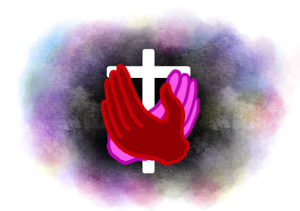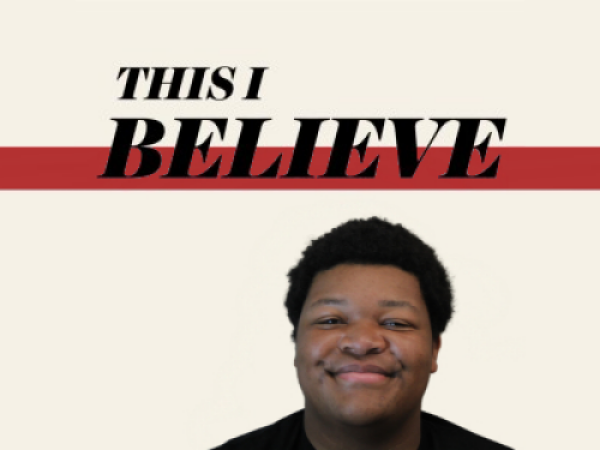Variety Staffer Antonio Starks is pictured on the ‘This I believe’ background. Starks shares thoughts on his relationship with religion and how he has grown to accept his own beliefs. Graphic by Anna Shaikun
Variety Staffer Antonio Starks talks about his struggle to come to terms with his religious upbringing and how that plays into his life.
Hi, I’m Antonio Starks, a junior and an Illustrator with the ODYSSEY Media Group at Clarke Central High School. The ODYSSEY has adopted a segment called “This I Believe” from NPR. These are essays that discuss the origin, importance and rationale behind people’s personal belief systems. Students will share their personal essays discussing how these beliefs affect their everyday lives, times they may have been challenged and how they may impact the lives of those around them. This is my this I believe.`
I don’t have faith in the religion that I was raised in. Christianity was always big in my family, it’s integrated into a lot of Black families across America. It was introduced to Black slaves through colonization and imperialism in order to keep them compliant and spread Christianity. In Ephesians 6:5-8, Paul states, “Slaves, be obedient to your human masters with fear and trembling, in sincerity of heart, as to Christ.”
I’m sure we all know the moral implications of a dominant society or facet of such using religion to oppress an entire group of people.
I’m not trying to dog on Christianity because I think it can be a beautiful religion, but the previous fact does turn me away from it. I was introduced to Mormonism from a young age, and it became my world, everything else was seen as a distraction. Everything that I did came back to religion and it influenced every action that I made, the way I talked, the way I acted and if I didn’t act a certain way I would be in a depressive state.

An illustration made to represent Variety staffer Antonio Starks’ feelings towards Christianity, being both close to his heart and being darkness that clouds over him. Starks was raised a member of the Church of Latter-Day Saints but has moved away from that part of his identity. Illustration by Antonio Starks
I had a life outside of that religion, but as with most religions, you bring it with you from your place of worship. I never felt like I was forced into it, but I think that way of life came easy to me when I was younger.
For the most part, I was more interested in the aspects of Mormonism that were fun, visiting my church friends, Boy Scouts, and Trunk Or Treating and in anticipation for those events, I was devout as can be. When it came to aspects of the church like conferences that lasted for 2 hours, I was bored as can be.
When my mom got a new job, we didn’t have much time to go to church and a few Sundays missed turned into years. Another thing that made me move away from the church was growing up more and seeing some of the more toxic sides of Mormonism. During one of the preteen classes, gay people came up and one of my friends who I had known most of my life said, “I have a gay cousin, we disowned him, but we still love him though.”
I was appalled by his casual tone when he said his family abandoned another family member and the audacity to say that they still care about them. As someone who is a part of the LGBTQ+ community, it just made me afraid to go to church. That’s when my separation from the church began.
At times I miss my friends who were a part of the church but I do see one of my church friends at Peer Court when I volunteer there. I feel happy to see them, but I also feel awkward and embarrassed, as if I had done something wrong. For a while, I felt like I had this void that I was simply unable to fill, but now I feel I’m making progress toward finding myself and making my own way through life by allowing myself to exist in a state of mind where I don’t owe my belief to anyone, but me, myself and I.
What got me through those times where I was lost, was hope. One of the only things that kept me from falling into despair was hope, and that was one of the things I learned from being a practicing Christian. Again, I think Christianity can be really helpful to people, but it just wasn’t for me. I never felt like it was for me, and it came with a lot of guilt and sadness.
I still do feel guilty about not going to church or not reading my scriptures, but I feel like I’m at a point where those specific feelings aren’t detrimental to my mental state. My mom is still a Christian, but I don’t mind and it’s not really my place to tell her what to believe in. She still tries to somewhat force Christianity on me.
For example, a few days after I told her that I wasn’t religious anymore, she told me that I can’t have Christmas gifts because of it and said it was a Christian holiday even though it’s a Pagan one. We quickly got over it and she never brought it up again, but she still sometimes thinks of my beliefs on religion as a childish phase, but it often turns into a joke.
As we all know and have heard a million times by now, 2020-2021 has changed all of us, but it has caused me to look at the mirror and ask myself, “What is it that I want?”
I don’t think I’ll be an Atheist anytime soon, but I don’t think I believe in any specific incarnation of God either. I don’t even think that I believe that I know if there’s only one god or a god at all. A deep belief in any religion or non-religion is nonexistent within me, and my life will be lived, or try to be lived as one with positivity and kindness.
I’ve researched what I think I might believe and it might change, but it kind of mimics the ambiguity I feel toward religion as a whole. I officially, in writing, have come out as Agnostic. It basically means, for me, that I accept that I don’t know crap about anything, and everything is possible.
The only thing I can do is to try to make the world a better place and to continue to be a happy and caring person. I’m not the way I am because of my religious upbringing exclusively, but it does play a part in my values and my goals.
I’m really coming into my own and taking what I’ve been given to live life the best way I can. I can say that I don’t really believe in Christianity anymore, but what I really believe and what I’ve always believed in, is hope.
